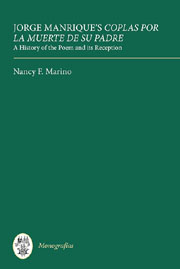Book contents
- Frontmatter
- Contents
- Dedication
- Acknowledgements
- Preface
- Chapter 1 The Author and His work
- Chapter 2 The Renaissance and Baroque Eras
- Chapter 3 Reception in the Eighteenth to Twenty-First Centuries
- Chapter 4 Shifting Literary Perspectives
- Afterword
- Appendix A Five Centuries at a Glance: A Selection of Comments about the Coplas
- Appendix B Additional Literary Responses since 1800
- Bibliography
- Index
Chapter 4 - Shifting Literary Perspectives
Published online by Cambridge University Press: 05 February 2013
- Frontmatter
- Contents
- Dedication
- Acknowledgements
- Preface
- Chapter 1 The Author and His work
- Chapter 2 The Renaissance and Baroque Eras
- Chapter 3 Reception in the Eighteenth to Twenty-First Centuries
- Chapter 4 Shifting Literary Perspectives
- Afterword
- Appendix A Five Centuries at a Glance: A Selection of Comments about the Coplas
- Appendix B Additional Literary Responses since 1800
- Bibliography
- Index
Summary
The Question of Genre
Much has been written about the genre of the Coplas, about whether it is an elegy, a sermon, a meditation, or other form of poetry that incorporates the various topics that Jorge Manrique takes up in his text. Most of the arguments make a case for a sole genre while allowing that the work also exhibits characteristics of other poetic forms. The most convincing conclusion that one can arrive at after reading the discussions and polemics that they have sometimes provoked is that the Coplas defy being categorized as one variety of text as opposed to others. The classification of medieval literary texts has been at the core of criticism since the 1700s, and in the twentieth century it became a mainstay of scholarship on Spanish works of the Middle Ages, with frequent debates on the genre of canonical texts such as the Libro de buen amor or Celestina. The desire to coax a work of indistinct genre into an exact or exclusive category is hindered by the fluid nature of literary forms in the era in question. The Libro de buen amor and Celestina are perhaps proof that their authors were not concerned with adhering to a specific form. The Coplas is probably another example: Jorge Manrique evidently knew well the various forms of verse written on the death of a revered figure, and was also familiar with the conventions of the sermon, and incorporated both in his composition apparently without concern about distinguishing genres.
- Type
- Chapter
- Information
- Jorge Manrique's 'Coplas por la muerte de su padre'A History of the Poem and its Reception, pp. 135 - 176Publisher: Boydell & BrewerPrint publication year: 2011



